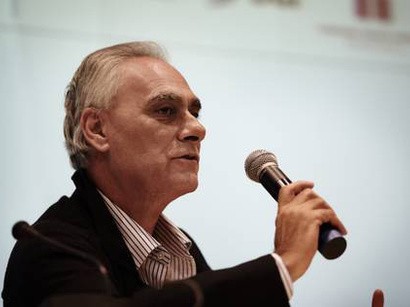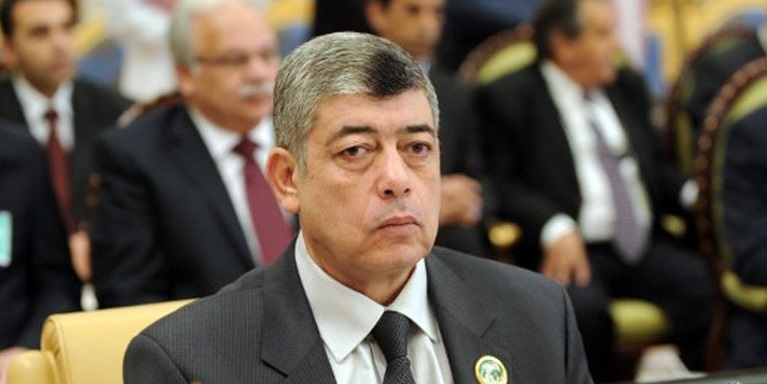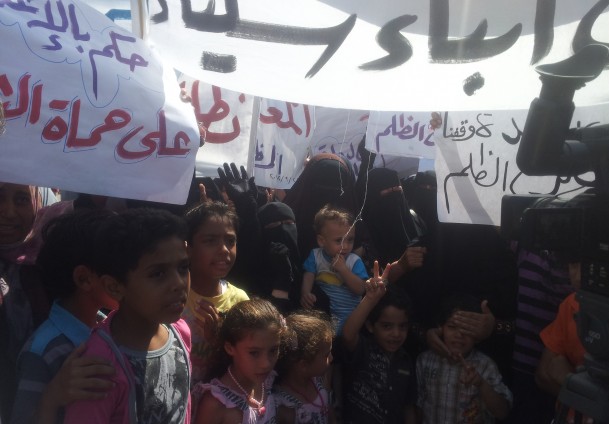Egyptian law enforcement authorities and the Egyptian Football Association (EFA), in a reflection of fears that stadia in Egypt could once more emerge as platforms for anti-government protest, have extended a ban on spectators attending matches that has been in place for much of the last five years.
The decision dashed expectations that the ban would be lifted in February with a new competition season. It comes against the backdrop of repeated Egyptian poor performance in international tournaments that many blame on the absence of fan support at matches.
Sports minister Khaled Abdel-Aziz used last month’s jihadist attacks in Paris, as well as the cancellation of an international football match in Germany because of an alleged threat by “Islamic State”, to justify continued closure of Egyptian stadia.
“There’s no need to be hurried on fans’ return as the world is on the edge of a cliff,” Abdel-Aziz said.
Egypt has failed to suppress its own jihadist insurgency in the remote Sinai that has also sparked a number of attacks in Cairo and other cities. The insurgency has been fuelled by the military’s brutal tactics as well as years of social and economic neglect of the Bedouin population in the north of the peninsula.
The decision to keep stadia closed constitutes a rejection of demands of some of the government’s key supporters in the business community who had called for a reversal of the ban. “The absence of football fans is a failure for Egypt and the interior and youth ministries. People are bored with politics now, but they never bore of football. Fans must attend matches again, but without new incidents. Matches are boring without fans,” billionaire Naguib Sawiris said last month.
Authorities have struggled with multiple options to enhance security in stadia. This could have involved a possible replacement of Egypt’s hated security forces with private security firms, some of which are owned by retired military officers, and the introduction of security technology, such as cameras and an electronic ticketing system.
Disagreement over who would pay for enhanced security has complicated efforts to lift the ban. So have differences between the interior and the sports ministry, as has Turkey’s experience with electronic ticketing that fans viewed as a way for the government to regain political control of stadia and identify dissenters. The Turkish attempt sparked a fan boycott that led to a dramatic drop in match attendance.
The issue of spectator attendance has put the government of general-turned-president Abdel Fattah Al-Sisi in a bind. If opening up stadia bares political risk, so does continued closure. The rival, militant, well-organised, and street battle-hardened football fan groups of storied Cairo clubs Al-Ahly SC and Al Zamalek SC insisted in a rare joint statement that the crowd ban be lifted immediately.
Deliberate or unwittingly lax imposition of stadium security measures by security forces resulted twice in scores of deaths in the past four years. Seventy-two Al Ahly fans died in February 2012 in a politically loaded brawl in Port Said that had the hallmarks of security forces deliberately looking the other way. Three years later, 20 Al-Zamalek fans were killed in a stampede at a Cairo stadium as the result of poor crowd control. Football fans are on trial in a number of court cases related to the two incidents, as well as other protests.
Both incidents highlighted an urgent need for security sector reform in Egypt. The interior ministry, which is responsible for police and security forces, has however so far successfully fended off calls for a thorough overhaul.
Al-Ahly’s Ultras Ahlawy and Al-Zamalek’s Ultras White Knights issued their statement after the two groups attended a handball match without incident. “Today, at Al-Ahly’s Abdullah bin Faisal court, fans decided to teach [authorities] an effective lesson. Everyone witnessed the presence of the largest sets of fans with few metres separating them and not a single problem occurred although there wasn’t any security,” the two groups said on Facebook.
Thousands of hard-core supporters of Al-Ahly and Al-Zamalek have for months attended their clubs’ training sessions to demonstrate that it was not them, but the security forces, who were responsible for repeated violent incidents.
The fans insisted in their statement that they were capable of handling security themselves. “Every time the fans take responsibility of their own safety, things pass very smoothly… The fans trust themselves and their ability to organise themselves. It’s not our fault that some parties are not able to carry out their duties,” they said in a snide at security forces and the interior ministry.
The notion of fans handling their own security is anathema to a regime that allows for no uncontrolled public space. Jihadist targeting of stadia in France, Germany, Iraq and Nigeria moreover gives the government a legitimate excuse in an environment in which security forces are as much part of the solution as they are part of the problem.
Allowing fans to shoulder responsibility for security is also a no-go for the government given the fact that the ultras played a key role in the 2011 popular revolt that toppled president Hosni Mubarak and most subsequent anti-government protests.
Militant football fans further formed the backbone of student protests against the government of Al-Sisi, who in 2013 staged a coup against Mohammed Morsi, Egypt’s first and only democratically elected government.
Al-Sisi has since then brutally suppressed Morsi’s Muslim Brotherhood, as well as all other expressions of dissent. He squashed the student protests by arresting hundreds, if not thousands, and turning universities into security fortresses.
“The ban on spectators is uniting rival fan groups. We have a common cause in fighting for our right to return to stadiums. This is an opportunity for the government to reach out to frustrated youth. They shouldn’t waste it,” said one ultra.
James M. Dorsey is a senior fellow at the S. Rajaratnam School of International Studies, co-director of the University of Wuerzburg’s Institute for Fan Culture, a syndicated columnist, and the author of The Turbulent World of Middle East Soccer blog and a forthcoming book with the same title.




